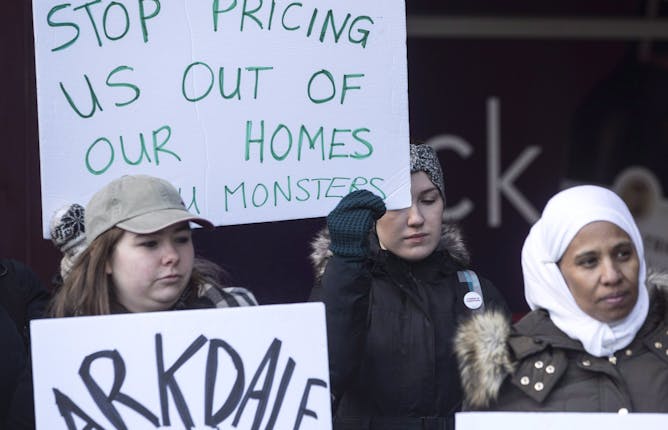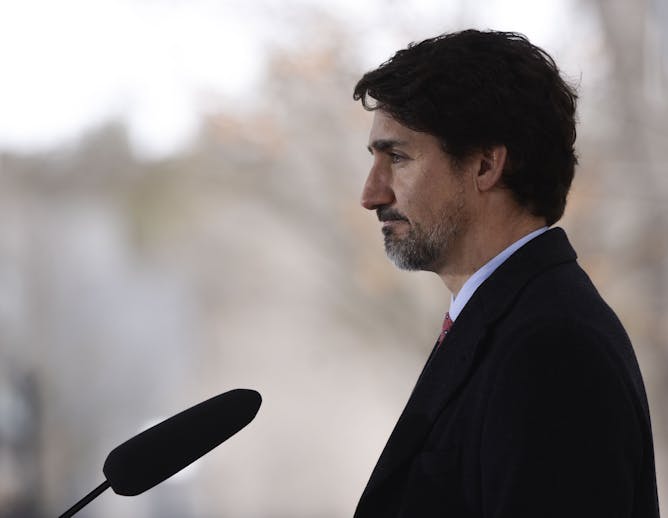|
As with everything else, the coronavirus pandemic is asking us to look at how — and where — we live.
Today in The Conversation Canada, the research highlighted in this piece by Howard Ramos, Alan Walks and Jill Grant shows that cities and neighbourhoods are becoming less affordable.
It's a situation that federal, provincial and municipal governments have all had a hand in creating.
If Canadians are being asked to stay at home, it begs the question: can we really afford to? The first of the month has come and gone for renters but few solutions have.
Also today:
|

Rent strikers from Toronto’s Parkdale neighbourhood and fellow protesters gather outside Social Justices Tribunal Ontario in February, 2018. The group refused to pay rent after the landlord applied for an increase in rents.
THE CANADIAN PRESS/Chris Young
Howard Ramos, Dalhousie University; Alan Walks, University of Toronto; Jill L Grant, Dalhousie University
It's time to reset Canada's housing policies to make cities more affordable and more socially just places to live.
|

Prime Minister Justin Trudeau addresses Canadians on the COVID-19 pandemic from Rideau Cottage in Ottawa on March 26, 2020.
THE CANADIAN PRESS/Sean Kilpatrick
Amy Swiffen, Concordia University
Given the structural limitations of Canadian federalism, the use of the Emergencies Act during the coronavirus pandemic could cause conflict between provincial and federal governments.
|

Online gaming communities can provide companionship and social stimulation.
(Shutterstock)
Aaron Langille, Laurentian University; Charles Daviau, Laurentian University; Jason Hawreliak, Brock University
Video games are a fun diversion, but they can also build connections and help address feelings of isolation and loneliness.
|

A cruise ship leaves Resolute Bay, Nunavut, in the summer of 2014.
(Silviya V. Ivanova)
Silviya V. Ivanova, University of Windsor; Aaron Thomas Fisk, University of Windsor
Arctic cod are key prey for seals, whales and seabirds. What happens when ship noise drives them away?
|

Bouger est essentiel en cette période de confinement et nombre d'études ont montré les bienfaits de la danse sur la santé.
shutterstock
Tegwen Gadais, Université du Québec à Montréal (UQAM); Bernard Paquito, Université du Québec à Montréal (UQAM)
La crise de le Covid-19 entraîne des confinements qui modifient radicalement notre quotidien. Pour passer à travers, il est important de demeurer actif et de conserver un mode de vie sain.
|

Faites attention aux recommandations des scientifiques. Rien ne prouve qu'embrasser à travers un masque - comme le montre cette image - est une pratique sûre. C'est le moment de faire preuve d'imagination et de pratiquer un autre type de sexe sans risque.
(Street art in Bryne, Norway, by Pøbel. Photo by Daniel Tafjord/Unsplash)
Gonzalo R. Quintana Zunino, Concordia University
L'activité sexuelle peut présenter des risques de transmission de la Covid-19. Un expert explique comment la prévenir et vivre sa sexualité sereinement en ces temps troubles.
|
COVID-19
|
-
Thomas Perls, Boston University
The CDC is reconsidering its policy about the widespread public's use of masks, as is the World Health Organization. Here are the facts about when it's appropriate to wear a mask – and what kind.
|
|
Science + Technology
|
-
Norm Friesen, Boise State University
An educational technology scholar illuminates some of odd feelings people experience when they communicate through cameras on the web.
|
|
Health
|
-
Rachael Rigby, Lancaster University
Evidence from a new study could help scientists develop drugs to neutralise the 'allergic antibodies' that cause anaphylaxis.
|
|